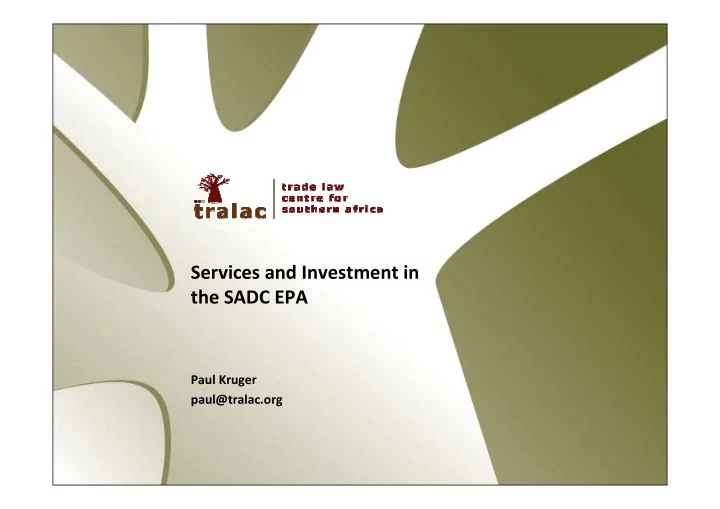

Services and Investment in the SADC EPA Paul Kruger paul@tralac.org
The process of negotiations Who are going to negotiate trade in services? • The unique position of Namibia – possible that more countries would have opted • out of the services negotiations if given the choice Things changed - more countries now appreciate the ‘ possible ’ benefits of • services liberalisation No guarantee that liberalisation will bring benefits • South Africa is very active on the African continent – why? • The answer might point to the decision of South Africa not to negotiate binding • commitments on trade in services
South Africa and services in the EPA No legal obligation or compelling reason for South Africa to negotiate services • We can speculate on the issues influencing South Africa’s decision – sequencing of • regional negotiations is crucial South African services industries are considerably more developed and this • informs the services strategy Point of view from the lesser developed neighbours is different – opening up their • markets would make more sense Problem of regional inequality historically addressed through the revenue sharing • mechanism Is there a suitable mechanism for a wider agenda? •
What now? Degrees of development are giving rise to differences in approaching services • negotiations The Common Negotiating Mechanism was suppose to address the differences as • provided for in Art. 31 (2) of the SACU agreement Member states are not in agreement on how to move forward with only • Botswana, Lesotho, Swaziland and Mozambique likely to negotiate But still no combined effort to negotiate together despite the advantages • Demanding undertaking to identify gaps in the target market or sensitive • industries in local markets Combining scarce resources and capacity makes more sense and even more • important now that the regional processes are underway
Investment in the CARIFORUM Services include: business; communications; construction and engineering; • distribution; educational; environmental; financial; health and social; tourism; recreational, cultural and sporting; transport; and other services Investment schedules in the CARIFORUM EPA: A) Agriculture, hunting and • forestry; B) Fishing; C) Mining and quarrying; D) Manufacturing; and E) Production, transmission and distribution on own account of electricity, gas, steam and hot water CARIFORUM EPA provides for the liberalisation of these investment sectors • Investment schedule sets out the liberalisation commitments i.e. to what degree • they are willing to open up their market for foreign competition The scope we dealing with here is exceptionally wide – we have to understand all • of these issues
Investment in the SADC EPA Services liberalisation has been addressed at the multilateral level - but not • investment liberalisation TRIMs and BITs deal with investment issues to some extent • Investment liberalisation is not addressed in SADC - investments are permitted in • accordance with national laws: Annex 1. Art. 2 “1. Each State Party shall promote investments in its territory, and admit such investments in accordance with its laws and regulations” How is investment addressed in the SADC EPA – seeing as the Investment Chapter • must take regard of the SADC Protocol on Finance and Investment: Art. 67: II.a) Investment “ 1. The Parties agree to negotiate an Investment chapter, taking into account the relevant provisions of the SADC Protocol on Finance and Investment..”
Conclusion Two important areas to prepare for the services and investment negotiations • 1) Improving our knowledge of the framework within which services and investment are regulated • Examination of domestic policies and laws to build internal capacity 2) The role of stakeholders in the process of negotiations • Best placed to identify opportunities and barriers in niche markets– these must feed into a services strategy • Ensuring there are avenues for constructive engagement to formulate an informed position
Recommend
More recommend